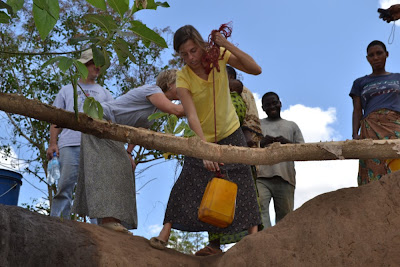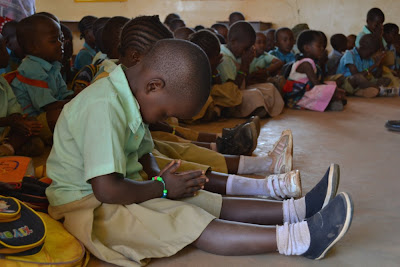In Tanzania, thousands and thousands of children are orphaned each day due to AIDS and other deadly diseases. This is particularly tragic because many of these kids grow up on the streets, never having the opportunity to go to school or to even know what it feels like to be loved and cared for.
One of my favorite things we did while we were in Tanzania was visit Samaritan Village, an orphanage in Arusha. Last year, while my dad and Brian were in Tanzania they also visited the Shalom Center and Brian snapped this photo:
The first time I saw this picture I was greatly moved. Those big brown eyes, full of wonder and hope, pierced right to the center of my heart. But as poignant as the image of his face was, it remained just that. An image. A picture. A nameless face. This is the problem that many of us face. People become numbers, lives become statistics, and little by little we become even further removed, as if the oceans that separate us weren't distance enough. These people become those people and, consciously or not, we begin to regard them as different, separate, or less than equal. At least that's what had happened to me.
But then one afternoon, I walked into a small orphanage at the end of a dusty, dirt road. The next thing I knew I was nearly tackled by a rambunctious little boy who wrapped his arms around my legs and completely stole my heart. In a booming voice he announced, “I am Everest.” And my life was changed.
This is Everest. Hours after he was born his father threw him in a dumpster with a plastic bag over his head. Someone found this precious boy and took him to the police, and he ended up at Samaritan Village. Doctors said there was a 75% chance he would never recover from the brain damage he sustained, and by the time he was one year old he was showing the signs of severe autism. Fast forward 4 years later and you can see the miracle that God has done in this child’s life. He is intelligent, outgoing, and full of life. He is the perfect example of God taking something that man intended for evil and turning it to good.
Meeting Everest was particularly meaningful for me, because he really made the crisis in Africa personal. He was more than a picture. He was a life. With a story. There is something deeply personal about finally putting a name with a face. Everest has a history, and the challenges that he has overcome in his short life are much greater than anything I could ever imagine. It is one thing to connect with the picture of small boy holding up a cup. You can see the emotion in his eyes and be overcome by empathy. But reaching down and holding his small hand was infinitely more moving.
We will not be able to overcome the debilitating effects of the global clean water crisis until we become acutely aware of the millions of individuals who are affected by it each day.
Mother Theresa said, "I never look at the masses as my responsibility; I look at the individual. I can only love one person at a time - just one, one, one. So you begin. I began - I picked up one person. Maybe if I didn't pick up that one person, I wouldn't have picked up forty-two thousand...."
The next time you pour a glass of water or donate a quarter to the Water to Wine project, I encourage you to think of Everest and say a little prayer.






























